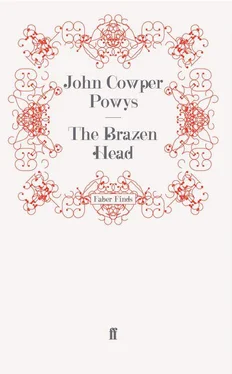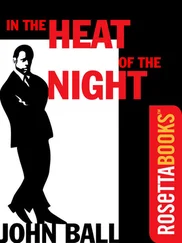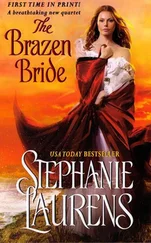With such thoughts obscurely flitting through his brain John left Ghosta and Peleg to their enjoyment of what he imagined must have been for them both one of the most important moments in their lives. Together they had vanquished the enemy; and John felt sure that after Ghosta’s ministration the giant’s arrow-hurts would soon heal.
What he didn’t feel sure of, as he turned from the two Hebraic lovers to Colin and Clamp, who were by this time engaged in what looked like an extremely absorbing whispered argument, was what effect this shock of falling with a jerk upon the earth would have upon the Head itself.
John had now been left, by the movement, so it seemed to him, of unadulterated fate, alone with the Head. He moved up so close to it that he soon stood within an arm’s reach of those inchoate and incomprehensible features.
The Head’s face, though it had been emptied by the deliberate intention of its creator, of all human expression, was in no way a blank face. The young man couldn’t help uttering an inward and entirely inarticulate prayer to that chaotic brazen physiognomy, while he made absurd attempts to rouse it to some emotion, if only to the emotion of anger, by moving the fiery gleam of the torch he held with repeated switches and twitches and flashes and dashes and whirlings and twirlings between himself and that imperturbably chaotic visage.
But the countenance of the Brazen Head remained completely unmoved. John might just as well have endeavoured to evoke an earthquake or a volcanic eruption by brandishing his torch at the floor of the forest, or to draw down flashes of lightning and torrents of rain by challenging with it what could be seen of the black sky above the tops of the dark trees!
But suddenly the young man felt impelled to stop playing this silly game, and to shift the manner of his hold upon the torch he was carrying. He now began holding it as humbly and reverently as if he were at the rear end of a long procession of worshippers who were moving towards a temple.
And he made this change at the identical moment when they all heard a familiar voice calling to them from the forest and not very far away.
“Good God!” cried John, “that’s the old man! I’d know his voice anywhere! Peleg, do you hear him? It’s the old bailiff! What on earth is he doing out there at this time of night? The family would be furious if they knew! How have they let him get out of the Fortress? Is he alone?”
But John was talking now to nobody but Ghosta; for Peleg had at once responded to the voice, and had been followed at a mad rush by Colin, whose crazy chucklings and wild gestures had been reduced to the purposeful leapings of a high-mettled steed, and also by Clamp, who kept blurting out as he bounced and bumped along, “I know’d it! I know’d it! I know’d it! I could have told ‘ee the whole tale if ye’d cuzzensented to ask it of I! Yes, I could have lighted up this whole blind, blubbered, bloated, blistered fog-patch we’ve gone and got lost in! Why didn’t ye come to I ‘stead of letting this kid of a Colin What’s-a-clock show itself off?”
And indeed it now struck young John, who was standing close to Ghosta, while she calmly watched the tide of events, that it was only the special kind of darkness of this particular night that had prevented them from recognizing how close they were at this moment to that little postern-door into the Fortress, of which Tilton and he had made use all their lives.
“ Here we all are, Master !” The genial voice of the Jewish Mongol carried such an implication of relief, of storms over and haven reached at last, that, as Ghosta moved forward to greet the old bailiff, John knew at once that his flash of insight was absolutely correct, and that they were now at this actual moment at the furthest end of the thick group of oaks and pines, which he had looked at since he was a child and about which, since they were first conscious of such things, they had heard their parents arguing.
Lady Val had always wanted to have those trees cut down, or at least considerably thinned out, as she regarded them as a perfect ambush both for wolves and for wolfish men; but such dense thickets of forest-growth were what, in the whole of Roque, her husband, who was a born hunter, especially loved.
Ghosta had never met the ex-bailiff before, as the old man only left the armoury for the Fortress dinner, his other meals being brought to him as he sat by the fire; so there now ensued in that wild place quite a formal and even courtly ceremonial. John felt it was incumbent upon him in the absence of both the lord and the mistress of the Manor, as well as of their elder son, to play the part of host; and the already somewhat exhausted old gentleman, who approached them leaning very heavily on Peleg’s arm, was now compelled to stand as erect as he could and shake hands, not only with Ghosta, but with both Colin and Clamp, while John, constantly interrupted by each gentleman in turn, did his best, with a good deal of blundering pedantry and not a little silly facetiousness, to introduce the one as a lively court-jester and the other as a disillusioned, cynical sage.
But, before he had finished, the look of pitiful exhaustion on the ex-bailiff’s face forced him to interrupt himself.
“Here, master,” he murmured, “sit down on this , and lean your back against this !” And lugging off the sheep’s wool neck-cloth that he had been wearing all that night, he laid it on the ground under the nearest tree-trunk and helped the old man to sit down.
Ghosta at once bent over him, while Colin and Clamp moved off. “Where — is — the — the — the Head?” murmured the old man anxiously, turning his own head this way and that.
Ghosta took the torch from John and ran to Peleg’s side; and John noticed that the first thing she whispered to the giant must have had to do with the arrow-wounds he’d received, for the giant promptly uncovered the places and held the light for her while she examined them.
“So all’s well?” John heard him utter in an interrogative whisper; and it was clear to him that the reply was reassuring.
As soon as she came back, still holding the torch, she asked the old man whether he wanted Peleg to bring the Brazen Head near to him, so that he could examine it. John could see that this bold question at once excited and troubled the ex-bailiff, for, snatching at Ghosta’s robe, he pulled her towards him till she sank on one knee, the torch held at arm’s length above her head.
After a second’s hesitation the old man began a rather bewildering and long-winded rigmarole about something he wanted to ask John. With considerable difficulty, but with more tact than he knew he possessed, John now listened to an agitated and complicated account of a conversation the ex-bailiff of Roque had had earlier in the month with John’s sister, Lil-Umbra.
The old gentleman seemed to have been deeply impressed not only by Lil-Umbra’s beauty but by her intelligence; and, as far as her young brother could make out from what he now heard, there had come a moment in the conversation when some mysterious presence, a presence whose nature neither of them really comprehended, seemed to come between them and to hover over them.
The old man had got it lodged in his head — John could see as much as that — that there was some magic bond, or some fatal link, between this mysterious Brazen Head of Friar Bacon’s invention and a beautiful young woman; and John himself was anxious to learn whether his own vague sense of something weird and unusual, and something that he couldn’t describe as either good or evil, either angelic or devilish, had been felt by Lil-Umbra also.
Old Heber’s hope was that Lil-Umbra may have talked to John about it; as he knew she was in the habit of discussing religious matters with both her brothers. The truth really was that Lil-Umbra’s nerves were so strung-up, and her heart was in such a state of tension, as to whether Raymond de Laon would or would not come to the armoury that night, that the whole subject of Friar Bacon and his Brazen Head passed her by very lightly indeed.
Читать дальше











